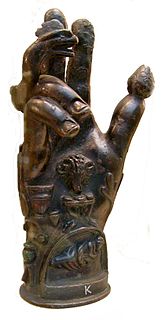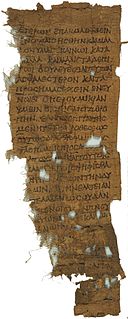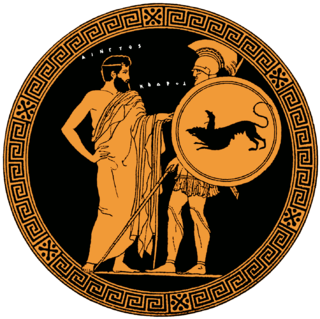
Amyntas III was king of the ancient Greek kingdom of Macedon in 393 BC, and again from 392 to 370 BC. He was the son of Arrhidaeus and grandson of Amyntas, one of the sons of Alexander I. His most famous son is Philip II, father of Alexander the Great. He is historically considered the founder of the unified Macedonian state.

Hubris describes a personality quality of extreme or foolish pride or dangerous over confidence, often in combination with arrogance. In its ancient Greek context, it typically describes behavior that defies the norms of behavior or challenges the gods, and which in turn brings about the downfall, or nemesis, of the perpetrator of hubris.

Demosthenes was a Greek statesman and orator of ancient Athens. His orations constitute a significant expression of contemporary Athenian intellectual prowess and provide an insight into the politics and culture of ancient Greece during the 4th century BC. Demosthenes learned rhetoric by studying the speeches of previous great orators. He delivered his first judicial speeches at the age of 20, in which he argued effectively to gain from his guardians what was left of his inheritance. For a time, Demosthenes made his living as a professional speech-writer (logographer) and a lawyer, writing speeches for use in private legal suits.
This article concerns the period 349 BC – 340 BC.

In Greek mythology, Hippomenes, also known as Melanion, was a son of the Arcadian Amphidamas or of Megareus of Onchestus and the husband of Atalanta. He was known to have been one of the disciples of Chiron, and to have surpassed other disciples in his eagerness to undertake hard challenges. Inscriptions mention him as one of the Calydonian hunters.

Aspasia was an influential immigrant to Classical-era Athens who was the lover and partner of the statesman Pericles. The couple had a son, Pericles the Younger, but the full details of the couple's marital status are unknown. According to Plutarch, her house became an intellectual centre in Athens, attracting the most prominent writers and thinkers, including the philosopher Socrates. There are also suggestions in ancient sources that the teachings of Aspasia influenced Socrates. Aspasia is mentioned in the writings of Plato, Aristophanes, Xenophon, and others.

Sabazios is the horseman and sky father god of the Phrygians and Thracians. In Indo-European languages, such as Phrygian, the -zios element in his name derives from dyeus, the common precursor of Latin deus ('god') and Greek Zeus. Though the Greeks interpreted Phrygian Sabazios as both Zeus and Dionysus, representations of him, even into Roman times, show him always on horseback, as a nomadic horseman god, wielding his characteristic staff of power.

Phyllis is a character in Greek mythology, daughter of a Thracian king. She married Demophon, King of Athens and son of Theseus, while he stopped in Thrace on his journey home from the Trojan War.
Aeschines of Sphettus or Aeschines Socraticus, son of Lysanias, of the deme Sphettus of Athens, was a philosopher who in his youth a follower of Socrates. Historians call him Aeschines Socraticus—"the Socratic Aeschines"—to distinguish him from the more historically influential Athenian orator also named Aeschines. His name is sometimes but now rarely written as Aischines or Æschines
Aeschines was an Athenian orator, one of ten Attic orators.

The relationship between Achilles and Patroclus is a key element of the stories associated with the Trojan War. Its exact nature has been a subject of dispute in both the Classical period and modern times. In the Iliad, Homer describes a deep and meaningful relationship between Achilles and Patroclus, where Achilles is tender toward Patroclus but callous and arrogant toward others. Homer never explicitly casts the two as lovers but they were depicted as lovers in the archaic and classical periods of Greek literature, particularly in the works of Aeschylus, Aeschines and Plato.

Prostitution was a common aspect of ancient Greece. In the more important cities, and particularly the many ports, it employed a significant number of people and represented a notable part of economic activity. It was far from being clandestine; cities did not condemn brothels, but rather only instituted regulations on them.

On the Crown is the most famous judicial oration of the prominent Athenian statesman and orator Demosthenes, delivered in 330 BC.
On the False Embassy is the name of two famous judicial orations, both delivered in 343 BC by the prominent Athenian statesmen and fierce opponents, Demosthenes and Aeschines.
Lysicles was an Athenian general and leader of the democratic faction in the city. He lived during the fifth century BC and possibly was a friend of Pericles.

Ctesiphon was an orator in Athens during the reign of Alexander the Great. He is best known for sparking the controversy that led to Demosthenes' speech On the Crown and Aeschines' speech Against Ctesiphon.
Aeschines of Miletus was a contemporary of Cicero, and a distinguished orator in the Asiatic style of eloquence, which, according to Cicero, "rushes with an impetuous stream. But it is not merely fluent; its language is ornate and polished."
Aeschines of Neapolis was an Academic philosopher who shared the leadership of the Academy at Athens together with Charmadas and Clitomachus about 110 BC, when Clitomachus was an old man. Diogenes Laërtius says that he was a pupil and favourite (paidika) of Melanthius of Rhodes.
De Optimo Genere Oratorum, "On the Best Kind of Orators", is a work from Marcus Tullius Cicero written in 46 BCE between two of his other works, Brutus and the Orator ad M. Brutum. Cicero attempts to explain why his view of oratorical style reflects true Atticism and is better than that of the Roman Atticists "who would confine the orator to the simplicity and artlessness of the early Attic orators."












